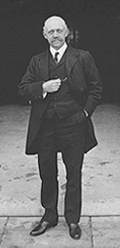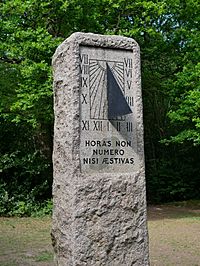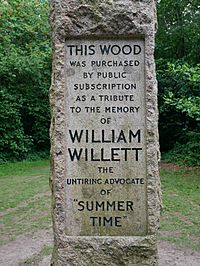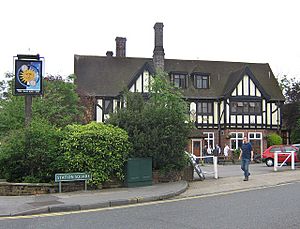William Willett facts for kids
Quick facts for kids
William Willett
|
|
|---|---|

Willett in 1909, photographed by Sir John Benjamin Stone
|
|
| Born | 10 August 1856 |
| Died | 4 March 1915 (aged 58) |
| Occupation | Builder |
| Known for | Daylight saving time |
| Relatives | Chris Martin of Coldplay (great great grandson) |
William Willett (born August 10, 1856 – died March 4, 1915) was a British builder. He is best known for strongly suggesting the idea of British Summer Time, also called Daylight Saving Time. This idea helps us use more daylight during the summer months.
Contents
William Willett's Life Story
William Willett was born in Farnham, Surrey, England. He went to the Philological School for his education. After gaining some experience in business, he joined his father's building company, Willett Building Services. Together, they became famous for building high-quality homes. Their "Willett built" houses were found in nice parts of London and the south, like Chelsea and Hove.
William Willett lived most of his life in Chislehurst, Kent. One summer morning, he was riding his horse in Petts Wood near his home. He noticed that many window blinds were still closed, even though the sun was already up. This made him think about how much daylight was being "wasted" in the mornings. This moment gave him the idea for daylight saving time.
The Idea of Daylight Saving
The idea of changing clocks to match daylight hours wasn't completely new. People in ancient times often adjusted their daily routines to the sun. In 1784, Benjamin Franklin jokingly suggested that people should get up earlier in summer. While Franklin's idea was simple, he is sometimes wrongly called the inventor of Daylight Saving Time. The modern idea of Daylight Saving Time was first suggested by a New Zealand scientist named George Vernon Hudson. However, many people incorrectly give credit to William Willett.
In 1907, William Willett used his own money to publish a pamphlet called "The Waste of Daylight." In this booklet, he suggested a plan. He wanted clocks to be moved forward by 80 minutes in total. This would happen in four small steps during April. Then, the clocks would be moved back the same way in September.
Willett believed that moving the clocks forward would make evenings lighter for longer. This would give people more time for fun activities outdoors. It would also save a lot of money, about £2.5 million, on lighting costs. He suggested moving the clocks forward by 20 minutes at 2 AM on four Sundays in April. Then, they would be moved back in September.
Making Daylight Saving Law
William Willett worked very hard to promote his idea. By 1908, he had gained the support of a Member of Parliament (MP), Robert Pearce. Mr. Pearce tried several times to get the idea passed into law, but he wasn't successful. Even a young Winston Churchill supported the idea for a while. A special group in Parliament looked at the idea again in 1909, but still nothing happened.
When the First World War started, the idea of daylight saving became much more important. Countries needed to save coal, which was used to make electricity for lights. Germany had already started using the daylight saving scheme. Finally, in Britain, the bill was passed on May 17, 1916. The clocks were moved forward by an hour on the following Sunday, May 21. This was done to help with wartime production under a law called the Defence of the Realm Act. After Britain, many other countries also started using daylight saving time.
William Willett sadly did not live to see his idea become law. He passed away from influenza in 1915, when he was 58 years old.
Remembering William Willett
William Willett is remembered in Petts Wood, where he got his famous idea. There is a special memorial sundial there. This sundial is always set to daylight saving time. A pub called The Daylight Inn in Petts Wood is named in his honor. There is also a road called Willett Way. His house in Chislehurst has a blue plaque on it, which is a special sign that marks important places. He is buried in St Nicholas' Churchyard in Chislehurst.
William Willett's Family
William Willett was married twice. First, he married Maria Mills in 1879. They had seven children together before she passed away in 1905. Then, in 1910, he married Florence Strickland, and they had one daughter.
Interestingly, William Willett is the great-great-grandfather of Coldplay singer Chris Martin.
 | Misty Copeland |
 | Raven Wilkinson |
 | Debra Austin |
 | Aesha Ash |




